 |
The Prose Edda gives a summary of Mjölnir's special qualities in that, with Mjölnir, Thor:
... would be able to strike as firmly as he wanted, whatever his aim, and the hammer would never fail, and if he threw it at something, it would never miss and never fly so far from his hand that it would not find its way back, and when he wanted, it would be so small that it could be carried inside his tunic.[1]
Etymology
Mjölnir simply means "crusher", referring to its pulverizing effect. Mjölnir might be related to the Russian word молния (molniya) and the Welsh word mellt (both words being translated as "lightning").
This second theory parallels with the idea that Thor, being a god of thunder, therefore might have used lightning as his weapon.[2] It is related to words such as the Icelandic verbs mölva ("to crush") and mala ("to grind"), and Swedish noun mjöl ("flour"), all related to English meal, mill, and miller. Similar words, all stemming from the Proto-Indo-European root *melə, can be found in almost all European languages, e.g. the Slavic melevo ("grain to be ground") and molot ("hammer"), the Greek μύλος (mylos—"mill"), and the Latin malleus "hammer", from which English mallet derives.
http://en.wikipedia.org/wiki/Mjölnir
ชื่อของค้อนที่แปลว่า บด อาจแผลงมาจากภาษาอื่นที่แปลว่าสายฟ้า ในคติ พุทธ วัชรเป็นอาวุธของพระอินทร์ คติฮินดู วัชรเกิดจากกระดูกสันหลังฤาษี ซูสของกรีกใช้สายฟ้า
Drawing of a 4.6 cm gold-plated silver Mjölnir pendant found at Bredsätra in Öland, Sweden. The original is housed at the Swedish Museum of National Antiquities.
มีลวดลายเส้นวนเวียนเป็นสามเหลี่ยม แบบปมอนันต์
| จากคุณ |
:
ต็กโกวคิ้วป้าย 
|
| เขียนเมื่อ |
:
11 ก.ย. 55 15:32:40
|
|
|
|
 |













